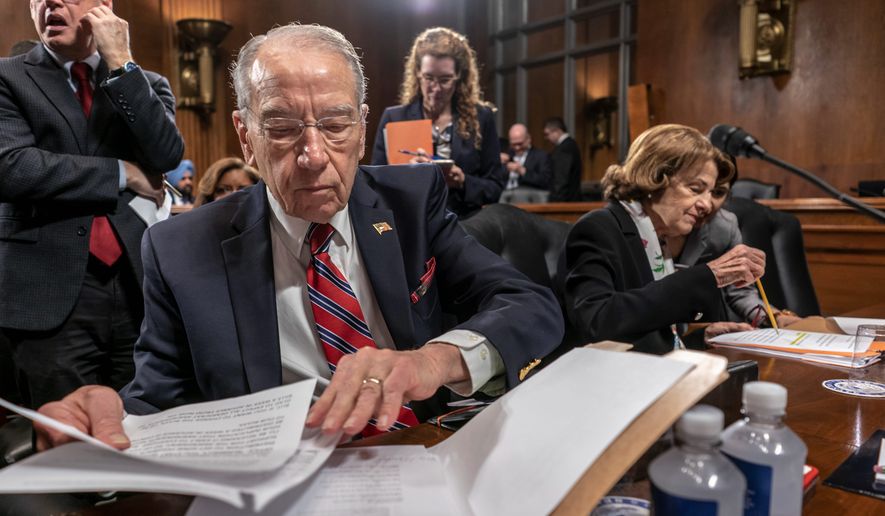The Senate Judiciary Committee is plowing ahead on a bill to protect special counsel Robert Mueller from being fired by President Trump — but the legislation might have to overcome more than just Republican opposition.
Sen. Chuck Grassley, the committee’s chairman, said it’s possible that limiting the president’s firing powers would be unconstitutional, which would cut out the heart of the bill.
Still, Mr. Grassley said he’ll allow a vote, scheduled for Thursday, after making a commitment to senators to bring up a bill if they could reach bipartisan agreement.
Sponsored by Republican Sens. Lindsey Graham and Thom Tillis and Democratic Sens. Chris Coons and Cory Booker, the bill would require give a fired special counsel a chance to challenge the dismissal in court. It would apply to all special counsels going forward, including Mr. Mueller.
“It’s appropriate for members of the Judiciary Committee to discuss constitutional issues with potential legislation,” said Mr. Grassley. “But it’s also important to acknowledge the fact that we are senators, not judges or presidents, though some in this room might like to be one day.”
The 1978 independent counsel law expired in 1992, after having been upheld in an 8-1 ruling by the Supreme Court.
Jonathan Turley, a law professor at George Washington University, said a special counsel today like Mr. Mueller is more a creature of the executive branch than the independent counsel was, so Congress may be courting a constitutional showdown by trying to curtail the president’s firing powers.
“This is a different court and the stakes would be high,” Mr. Turley said. “Congress would be on far better footing to have simply reinstated the independent counsel act if it wanted to substantially improve protections in such an investigation.”
Josh Blackman, a professor at South Texas College of Law, also doubted the bill’s constitutionality.
“I don’t think the statute will pass muster,” he said. “The executive power of prosecution belongs to the president. It’s not for Congress to control.”
Robert Destro, a law professor at the Catholic University of America, said the concept of a special counsel itself is unconstitutional.
“The special prosecutor law that ensnared both Ted Olson and Bill Clinton was (in my view) unconstitutional because the very nature of such an appointment places a premium on filing charges. This violates one of the most fundamental of ethical canons: That a lawyer’s interests should not be in conflict with those of his client,” Mr. Destro said in an email.
But the bill’s sponsors are determined to push ahead, saying they’ll let the judges figure it out later.
“I’m not a constitutional scholar. I’m not an attorney. That’s what we have a court system for,” said Mr. Tillis, North Carolina Republican.
Senate Majority Leader Mitch McConnell has flatly ruled out bringing the bill to the floor even if it clears the committee.
Democrats said they hope a strong committee vote will persuade the Kentucky Republican to change his mind.
Even then, it would have to clear the House, and after that Mr. Trump would likely veto the legislation. There’s little chance of getting a two-thirds vote in both chambers to overturn a veto.
Mr. Tillis said he doesn’t think Mr. Trump will oust Mr. Mueller, but he said Congress should pass the bill for the sake of future investigations.
He added that Democrats’ decision to make the bill about Mr. Trump is hurting its chances.
“Shame on everybody who wants to make a point, not make a difference,” he said.
On Friday, Bloomberg reported that Deputy Attorney General Rob Rosenstein, who is overseeing the Mueller investigation, assured Mr. Trump that he is not a target of the probe. Some analysts said that could lessen any presidential intention to fire Mr. Mueller.
Advocacy groups that have been pushing for Congress to protect Mr. Mueller from being fired still want to see action.
“Our representatives in Congress work for us, not for President Trump. They need to pass legislation to protect the Mueller investigation,” said Marge Baker, executive vice president at People For the American Way, which signed onto a letter to Congress with 16 other groups this month urging lawmakers to pass a bill.
• Alex Swoyer can be reached at aswoyer@washingtontimes.com.




Please read our comment policy before commenting.